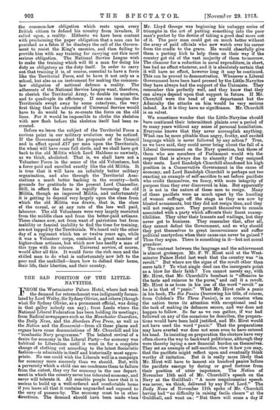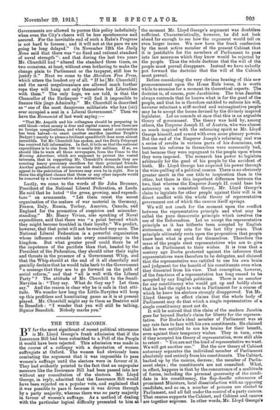THE SAD POSITION OF THE LITTLE- NAVYITE S. F ROM the
Westminster Palace Hotel, where last week the demand for retrenchment was indignantly formu- lated by Lord Welby, Sir Sydney Olivier, and others (though what Sir Sydney Olivier, as a permanent official, was doing in that galley nobody can say) ; from Leeds where the National Liberal Federation has been holding its meetings; from Radical newspapers such as the Manchester Guardian, the Daily News, and the Aberdeen Free Press, as well as the Nation and the Economist—from all these places and organs have come denunciations of Mr. Churchill and his "bombastic Navy programme." The belated revival of a desire for economy in the Liberal Party—for economy was habitual to Liberalism until it went in for a complete change of clothing cut according to the latest Socialistic fashion—is admirable in itself and historically most appro- priate. No one could wish the Liberals well in a campaign for economy more sincerely than we should. But, with a perversity which a child can see condemns them to failure from the outset, they cry for economy in the one depart. ment in which the country never has tolerated economy, and never will tolerate it. All sensible people know that it is useless to build up a well-ordered and comfortable home if you leave all that it contains unguarded and exposed to the envy of passers-by. The economy must be in other directions. The demand should have been made when Mr. Lloyd George was beginning his unhappy series of triumphs in the art of putting something into the poor man's pocket by the device of taking a good deal more out of it. The poor man could get on much better without the army of paid officials who now watch over his career from the cradle to the grave. He would cheerfully give them a parting kick to help them on their way if the country got rid of the vast majority of them to-morrow. The clamour for a reduction in naval expenditure, in short, has had no effect whatever, and it is absolutely certain that it will have no effect, however long it may be continued. This can be proved to demonstration. Whenever a Liberal Government have been hard pressed by the Little-Navyites they have always had the support of the Unionists. They remember this perfectly well, and they know that they can always depend upon that support in future. If Mr. Churchill were the head of any department but the Admiralty the attacks on him would be very serious indeed. As it is they have no significance. Mr. Churchill is on velvet.
We sometimes wonder that the Little-Navyites should have continued their intermittent plaints over a period of so many years without any sense of personal humiliation. Everyone knows that they never accomplish anything. What can be more pitiable than angry, frothy, and excited language which is never followed by any action ? True, as we have said, they could never bring about the fall of a Liberal Government on the Navy question, but those of them who are members of Parliament would win the respect that is always due to sincerity if they resigned their seats. Lord Randolph Churchill abandoned his high position in a Conservative Government in the cause of economy, and Lord Randolph Churchill is perhaps not too exacting an example of self-sacrifice to set before pacifists who credit themselves, we fancy, with more integrity of purpose than they ever discovered in him. But apparently it is not in the nature of these men to resign. Many of these pacifists were as much upset by the hustling of woman suffrage off the stage as they are now by bloated armaments, but they did not resign then, and they will not resign now. They permit themselves to remain associated with a party which affronts their finest suscep- tibilities. They utter their laments and wailings, but they never get to business. They remember that, after all, they cannot defeat the Government, and so why should they put themselves to great inconvenience and suffer political martyrdom when their cause can never be gained ? Thus they argue. There is something in it—but not moral grandeur. The contrast between the language and the achievement is almost grotesque. Mr. F. W. Hirst said at the West- minster Palace Hotel last week that the country was "in revolt." But where are the signs of the revolt other than mere talk ? To what single deed can the insurgents point as a blow for their faith ? You cannot merely say, with Mr. Hirst, that Mr. Churchill's bombast is " offensive to the taste and ruinous to the purse," and call it a revolt. Mr. Hirst is as loose in his use of the word " revolt " as he is in that of " panic." What Mr. Hirst calls a panic in his book, The Six Panics (borrowing his title, of course, from Cobden's The Three Panics), is an occasion when the nation turns its attention with exceptional zeal to the task of making its defences secure, and war does not happen to follow. So far as we can gather, if war had followed on any of the occasions he describes, the prepara- tions would have been held justified, and Mr. Hirst would not have used the word " panic." That the preparations may have averted war does not seem even to have entered his head. In insisting on preparation the electors have very often shown the way to backward politicians, although they were thereby laying a new financial burden on themselves. They set an example of self-sacrifice, view it how you may, that the pacifists might reflect upon and eventually think worthy of imitation. But it is really more likely that Mr. Hirst will have to lament six hundred panics before the pacifists emerge by daring or good fortune from their position of utter impotence. The Nation of November 15th said of Mr. Churchill's speech on the Navy at the Guildhall : " A more megalomaniac speech was never, we think, delivered by any First Lord." The Daily News of November 11th spoke of Mr. Churchill having had "no difficulty in raising facile cheers" at the Guildhall, and went on: " But there will come a day if Governments are allowed to pursue this policy indefinitely when even the City's cheers will be less spontaneous and assured. For the inevitable end of such a Rake's Progress is not hard to foresee ; and it will not at the pace we are going be long delayed." On November 12th the Daily News said that there was "no fixed and rational standard of naval strength ": and that during the last two years Mr. Churchill had " altered the standard three times, on two occasions, at least, without even bothering to make the change plain to Parliament or the taxpayer, still less to justify it." Next we come to the Aberdeen Free Press, which utters the loudest cry of all. " If he [Mr. Churchill] and the naval megalomaniacs are allowed much further rope they will hang not only themselves but Liberalism with them." The only hope, we are told, is that the Chancellor of the Exchequer " will find it impossible to finance this jingo Admiralty." Mr. Churchill is described as " one of the most dangerous militarists who has (sic) ever occupied a seat in a Liberal Government." Then we have the Economist of last week saying :— " That Mr. Asquith and his colleagues should be preparing in cold blood—when money is dear and capital scarce, when there are no foreign complications, and when German naval construction has been halved—to exact another sacrifice (another People's Budget !) merely to please a brilliant spendthrift does seem almost incredible. Yet Mr. Churchill has spoken, and the Daily Telegraph has received full information. In fact, it tells us that the national expenditure is to rise from 188 to nearly 200 millions. If so, we should like to warn all those newspapers, from the Times to the Morning Advertiser, which are supposed to protect the vested interests, that in supporting Mr. Churchill's demands they are courting heavy pecuniary sacrifices for their principal friends. Another graduation of income-tax and death duties, and another appeal to the patriotism of brewers may soon be in sight. Nor is there the slightest chance that these or any other imposts would be removed by a Conservative Administration."
Lastly, we come to the words of Sir John Brunner, President of the National Liberal Federation, at Leeds. He said that he hated " the gross, growing, mad expendi- ture " on armaments. " Let them resist the secret organisation of the makers of war material in Germany, France, Italy, Russia, Turkey, America, Canada, and England for the promotion of suspicion and misunder- standing." Mr. Henry Vivian, also speaking of Naval expenditure, said that there was " a point beyond which they might become troubled in their loyalty." We predict, however, that that point will not be reached very soon. The National Liberal Federation is a powerful organisation whose influence extends into every constituency in the kingdom. But what greater proof could there be of the impotence of the pacifists than that, headed by the President of the Federation, they should utter their sighs and threats in the presence of a Government Whip, and that the Whip should at the end of it all cheerfully and genially declare that he would take back to the Government " a message that they are to go forward on the path of social reform," and that " all is well with the Liberal Party " ? The attitude of Mr. Churchill to the Small- Navyites is : " They say. What do they say ? Let them say." And the reason is clear why he is safe in that atti- tude. We wonder how long the Little-Navyites will keep up this profitless and humiliating game as it is at present played. Mr. Churchill might say to them as Beatrice said to Benedick : "I wonder that you will still be talking, Signior Benedick. Nobody marks you."



















































 Previous page
Previous page